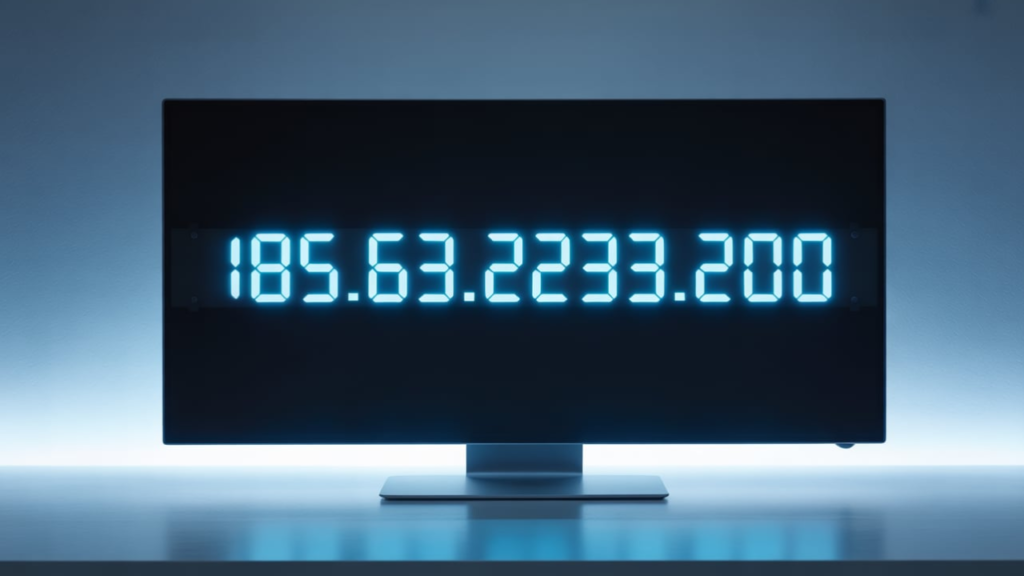Have you ever stumbled upon a strange string of numbers online, like 185.63.2253.200, and wondered: What exactly am I looking at? Maybe it was in your server logs, a security alert, or even a shady-looking email header. Whatever the case, one thing is clear — something about that number just doesn’t feel right.
And you’re correct to feel that way.
Let’s dig into why this particular IP address is invalid, and more importantly, why understanding IP addresses is more relevant to your online life than you might think.
🧠 Wait… 185.63.2253.200? That’s Not a Real IP Address
Let’s clear this up right away.
A standard IPv4 address is made up of four numerical groups (called “octets”), each ranging from 0 to 255, separated by periods. The address 185.63.2253.200 contains a “2253” — which far exceeds the legal max of 255 — making it invalid.
But don’t leave just yet. This “invalid” string is a surprisingly helpful entry point to understanding:
- What valid IP addresses do
- How they impact your digital security
- Why they’re increasingly vital in SEO, web hosting, and user privacy
🔍 Why Do People Search for IP Addresses Anyway?
Let’s say you were looking for 185.63.225.200 — now that is a valid IP address. What would your intention likely be?
Common reasons include:
- 🔎 Finding the owner or ISP
- 🌍 Locating the country or region
- ⚠️ Checking if it’s been blacklisted or used maliciously
- 🔧 Troubleshooting network problems
- 🔍 Investigating online threats or spam
- 🧭 Performing a reverse IP lookup to find hosted domains
Real-World Example:
Imagine your ecommerce site is suddenly swamped with fake traffic. You dig into your logs and find that it’s all coming from a mysterious IP: 185.63.225.200. A quick lookup reveals it’s tied to a known botnet server. Bingo — now you know to block it and report it to services like AbuseIPDB.

🧰 Top Tools to Investigate an IP Address (or Anything That Looks Like One)
Even though 185.63.2253.200 isn’t a real IP, these tools will help with any valid IP address you need to research:
| Tool | What It Does |
|---|---|
| IPinfo.io | Shows ownership, ASN, VPN usage |
| MXToolbox.com | Email tools, DNS lookup, blacklist checks |
| AbuseIPDB.com | Community-driven IP threat intelligence |
| YouGetSignal.com | Reverse IP lookups — what sites share the same server |
| IP2Location.com | Deep dive into geolocation |
| VirusTotal.com | Malware & threat association checks |
These are the go-to platforms that dominate Google’s results for IP lookups. Each provides a unique piece of the puzzle — especially useful in digital forensics, server administration, and SEO audits.
🕵️♂️ IP Addresses & SEO — A Hidden Connection
Yes, even in the world of search engine optimization, IP addresses matter. Especially when it comes to hosting.
Shared IP vs. Dedicated IP:
- Shared IP: Common in cheap hosting. Multiple websites, one IP. If a neighbor gets blacklisted, you might suffer too.
- Dedicated IP: You’re the sole occupant. More control. Better for email deliverability, reputation, and sometimes… Google’s trust.
Hosting your site on a suspicious IP (whether knowingly or not) can raise SEO red flags. Want to check who else lives on your IP? Use a reverse IP lookup tool.

📈 Related Keyword Variations You Might Be Searching
Even if “185.63.2253.200” was a typo, here’s what people often search instead:
ip 185.63.225.200what is 185.63.225.200 used for185.63.225.200 locationreverse ip lookup 185.63.225.200is 185.63.225.200 safe?who owns 185.63.225.200
Google’s “People Also Ask” for these terms typically include:
- What is a public IP address?
- Can someone trace my IP?
- Is an IP address private?
- How do I protect my IP from hackers?
🧠 A Bigger Picture: The IP Identity Crisis
We often forget how much our IP address says about us. It’s like your digital “home address” — revealing:
- Your general location
- Your ISP
- Sometimes, even device-level patterns
It’s no wonder VPN services are booming. People are waking up to the fact that an IP can be a beacon — sometimes for connection, sometimes for surveillance.
🛡️ How to Protect Your IP Identity
You don’t need to be a hacker or IT admin to take basic steps:
- Use a VPN to mask your real IP
- Avoid clicking unknown email links (they may log your IP)
- Configure firewalls to monitor traffic sources
- Regularly check logs for unfamiliar IP access attempts
And if you’re running a site, monitor visitor IPs with tools like Cloudflare, Google Analytics, or your server’s firewall.

💡 Final Thoughts: When a Wrong IP Teaches the Right Lesson
Sure, 185.63.2253.200 doesn’t exist — but that didn’t stop it from unlocking a deeper understanding of how vital IP addresses really are. Whether you’re a tech pro, SEO strategist, or just someone surfing the web more mindfully, knowing how IPs work gives you more control, security, and insight in an increasingly connected world.

